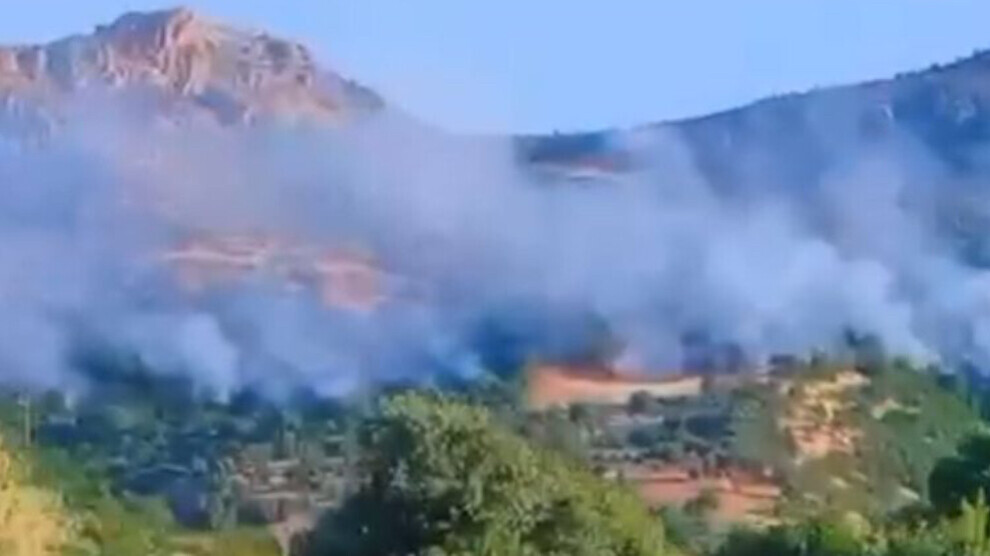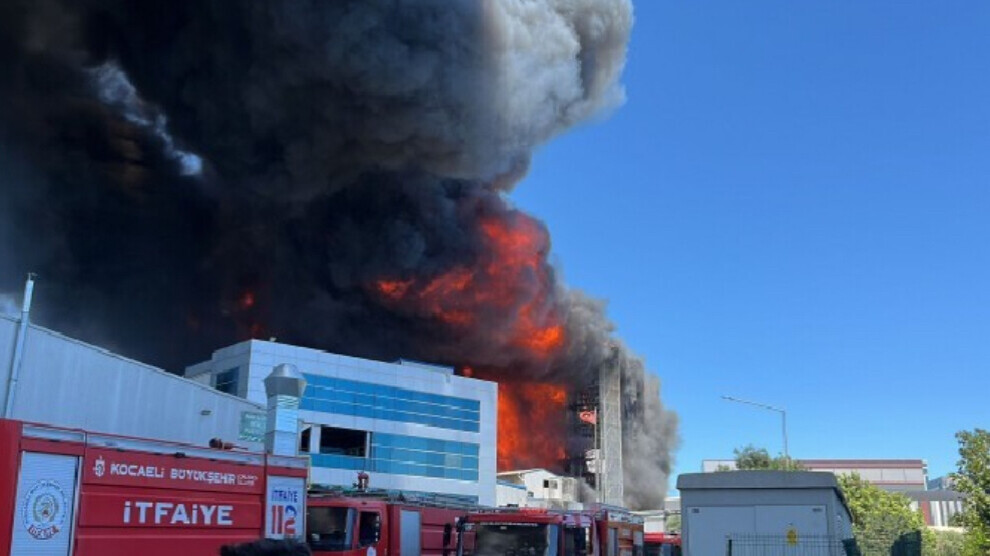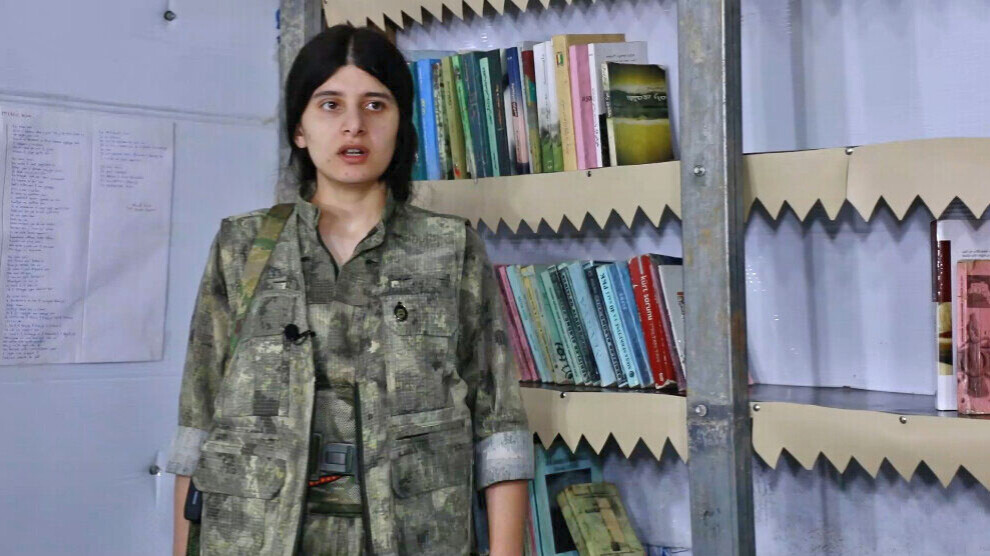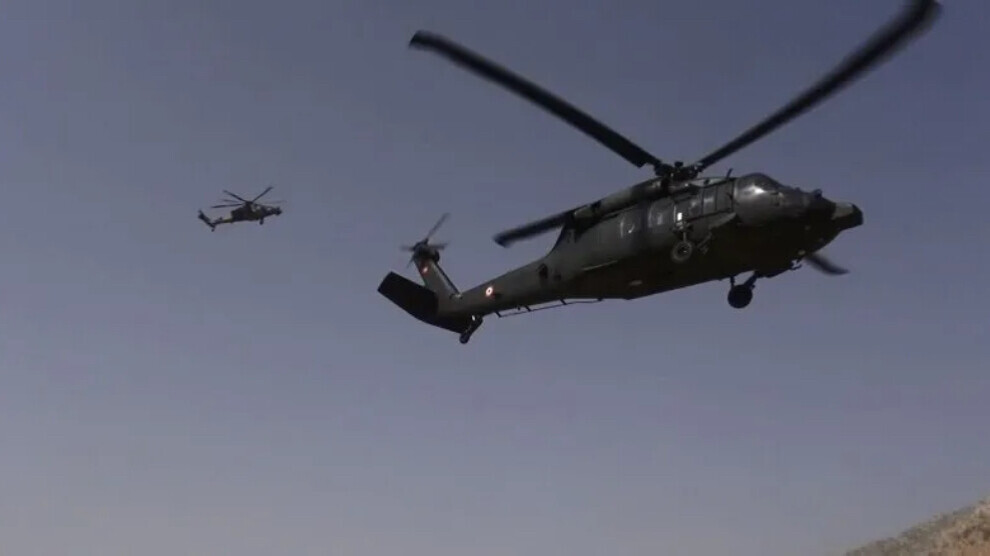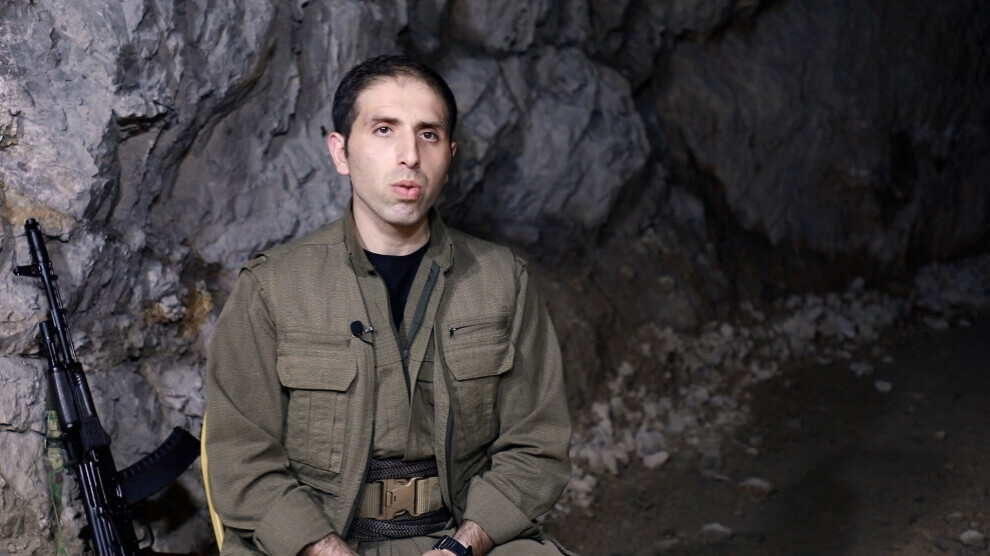Kurdish freedom and the Kurdish women’s freedom will set the standard for all freedoms and democracies
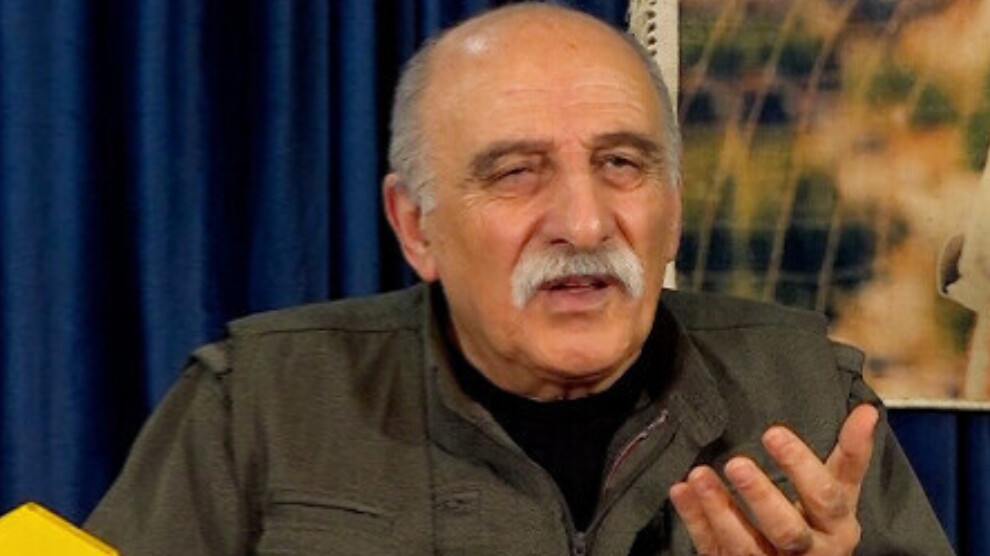
ANF
BEHDINAN
Sunday, 16 June 2024, 07:49
In the third part of this interview, KCK Executive Council member Duran Kalkan, spoke about the recent Middle East Youth Conference held in Beirut and paid tribute to martyr Zilan (Zeynep Kinaci) on the 28th anniversary of her death.
Zeynep Kinaci (Zilan) is one of the best known heroes of the Kurdish women’s movement. At a time when the Kurdish women’s movement and Rêber Apo [Abdullah Öcalan] was under attack, the then 23-year-old took the initiative and carried out a self-sacrifice action in Dersim (tr. Tunceli). She detonated a bomb during a military parade of the Turkish army, killing and injuring more than a hundred Turkish soldiers. Zeyneb Kinaci lost her life during this action on June 30, 1996.
The first part of this interview can be read here and the second here.
Recently, the Middle East Youth Conference was conducted in Beirut. How do you evaluate the conference?
We listened to the results of the Middle East Youth Conference, albeit briefly. There were very important discussions, and important results. 95 young delegates from all societies in the Middle East and North Africa, representing 25 youth organizations from 15 countries, took part in the conference. I want to congratulate the youth of Lebanon and the Middle East on their success. The Kurdish youth participated actively in the conference as well. The question is how the development of the freedom struggle in Kurdistan positively affects the Middle East. How does it bring the youth, women, workers, laborers, and peoples closer together? We saw a concrete and practical example of this in Beirut. It was a meeting of historical importance. From Libya to the Caucasus, from Yemen to Kurdistan, in an environment where so many wars, problems intensify, and conflicts continue, there was a meeting determined to solve all these problems and to lead the way in the search for a democratic solution. Joint decisions were made, and that is of very great importance.
On this basis, I congratulate all those who participated in the Middle East Youth Conference. Its results are of great historical importance. It means great success. We believe that the decisions taken during the conference will be implemented step by step. Some evaluations have already been made in that direction. It was seen during the conference, that those young people are strong-willed as to implement the decisions they have jointly taken. We believe that the appropriate mechanisms to be able to achieve this have been organized. Therefore, the struggle for freedom and democracy in Kurdistan will spread to the entire Middle East and North Africa under the leadership of the youth. This is very clear and will yield results.
It is necessary to know that in the same Beirut, 45 years ago, Rêber Apo established relations with representatives of the Palestinian people, members of the ‘Palestine Liberation Organization’ (PLO), and the Lebanese and Beirut youth, made alliances with them, and worked together. This 45-year-old great struggle continues today. A great intellectual and political will emerged that brought the youth of the Middle East together, paved the way for the Middle Eastern Democratic Confederalism on the basis of Kurdish freedom, and initiated the process leading to this. Back then, Rêber Apo launched his second move from Beirut. Now the Kurdish youth, together with the youth of the Middle East and their peers, are making a breakthrough in Lebanon after 45 years. Just as Rêber Apo set out 45 years ago and brought us here, we believe that the youth will take advantage of this conference, put its resolutions into practice and spread the struggle for freedom and democracy in Kurdistan throughout the whole Middle East and North Africa.
The youth of the Middle East must know that for more than 200 years of European capitalism, capitalist modernity has been attacking the Middle East. It has been waging war in the Middle East for more than a hundred years. It wants to establish complete dominance over the Middle East. This was also a topic discussed at the conference, stating that they reject all foreign interventions. They said that no foreign intervention, especially the Greater Middle East Project, can bring democracy to the Middle East. They added that the democratic will of the peoples of the Middle East will emerge through solidarity and that, as young people, they will lead the way. Hope and a will were put forward by the youth in Beirut. It is important for young people to intervene in Gaza, Kurdistan, Yemen, and other places where there is so much bloodshed, so many problems, and so many ideological, political, and military attacks and conflicts of interest that inflict oppression on the people of the Middle East, every day. It is important that they put forward a will, come together, and decide to make a change. This really gives hope and generates great excitement. We strongly believe that this will continue.
I want to add one thing for the Kurdish youth and the youth of the Middle East. They must understand foreign attacks, the henchmen in the Middle East, the collaborationists, and the nation-state groups correctly. Nothing positive can be expected from them. Power and the future are in the hands of the peoples, in the hands of women. The young people are in a position that gives spirit, dynamism, and leadership to such a popular movement as ours. They should be well aware of this reality. They should educate themselves well, organize themselves more strongly, and be more resistant. Against this war of interests, the youth should be able to develop the struggle for existence and freedom in solidarity with each other everywhere, in every country, and among every society. Otherwise, the democratization and liberation of the Middle East will not be possible. In terms of educating oneself, it is Rêber Apo who has analyzed the attack on the Middle East, the historical reality of the Middle East, the characteristics of its societies, and the solutions to the problems in the most concrete and realistic way. All youths should read Rêber Apo’s prison writings, and these writings should be disseminated to the youth of the Middle East. The youth should educate themselves on the basis of Rêber Apo’s paradigm. This is very, very important. What is right and what is wrong? Who is a friend, who is a foe? What is ugly, and what is beautiful? In order to gain the correct answers to these questions, in order to understand the reality of the Middle East, in order to form a free and democratic will in the Middle East, and in order to become a pioneering youth movement, there is a lot to learn from Rêber Apo. There is a lot to learn from his prison writings. There is a resistance that Rêber Apo started 45 years ago in Beirut in solidarity with the Palestinian people and particularly the PLO. Now, this relationship has turned into a massive foundation for democracy and freedom. The Palestinian resistance continues in various forms, but we also see the situation in Gaza. It is necessary to save Gaza from that situation, to turn the struggle of the people into a resistance for freedom, and to take it to a level that leads and inspires the Middle East. The resistance in Kurdistan is carried out on this basis. It is necessary to bring other regions to this level too. There are many things to learn from Rêber Apo. His prison writings must be read, his struggle and practice must be studied, and his style, pace, and way of working must be studied.
Back then, Rêber Apo started from scratch. He went alone to Lebanon, to Beirut. He didn’t even have an interpreter, and he didn’t have any friends there. He started from scratch, developed everything, and created a Kurdistan freedom resistance that now plays a leading role in the Middle East. He was young and alone back then. It can be done, and a lot can be learned from Rêber Apo. Everyone can learn and develop similar practices. In this respect, we believe that the results of this conference will be put into practice in such a spirit, especially by taking upon the Apoist tenets and tempo, by creating the necessary organizational institutions, and by continuing the necessary discussions and meetings. The youth will not surrender to the attacks of capitalist modernity and this nation-state collaborationist system. It will liberate the Middle East from them.
Ideologically, politically and militarily, the youth will develop the struggle for freedom and democracy by organizing in comradeship and solidarity. Against scientism, religionism, sexism and nationalism, and all other kinds of ideological attacks on the liberalism of capitalist modernity, the youth will stand for democratic modernity. They will learn about democratic socialism, acquire a consciousness of freedom and democracy, educate themselves, organize themselves, and develop organizations on a regional as well as a national level. We have started a process leading to a Democratic Confederal Middle East. The problems of the Middle East will be solved through the Democratic Confederalism and the youth will be the vanguard of creating this.
We hope and believe that this process of struggle will gain great momentum. It will add momentum to an already ongoing process. The fact that this was achieved under such difficult and unfavorable conditions is a great success in itself. On this basis, I once again congratulate the young comrades on behalf of our party and wish them great success in their struggle for freedom and democracy.
We are approaching 30 June, the 28th anniversary of the martyrdom of Zeynep Kinaci, otherwise known as Zilan. What would you like to say in relation to this?
On the 28th anniversary of her martyrdom, I would like to commemorate comrade Zilan and all our June martyrs with respect, love, and gratitude. Among our movement, June was defined as the month of sacrifice, and our women’s movement defines it as the month of the woman’s self-sacrificial stance. Comrade Gulan, comrade Sema, and dozens of other female comrades were martyred this month. These were all sacrificial pioneers. Through them, June became the month of sacrifice in the history of our struggle. During those 28 years, this sacrificial struggle was developed even further. The guerrillas of the HPG and YJA Star are waging a struggle in the Medya Defense Areas and all over Kurdistan, based on this legacy. Our youth and women’s movement is sacrificially fighting on the tenets created by comrade Zilan.
I would like to point out that under the leadership of Zilan, the women and entire society of Kurdistan are becoming more sacrificial. Zilan dragged the Kurdish people and women into such a sacrificial struggle. She liberated them and gave them a will. The trustee appointment policies of the government directly target this. If one pays attention, it can easily be observed that they are attacking so that women cannot live with their will and freedom, so that Kurds cannot live with their will and freedom, so that they cannot govern themselves. This is the fundamental aim of the attack on the municipalities. The Kurds who are being liberated through their sacrifice, the liberated woman in particular, really frightens the nation-state. It frightens the male-dominated mentality, politics, and system. It frightens the fascist, colonialist, and genocidal mentalities and system. The state is afraid that it will lose its sovereignty: a cruel life based on lies and oppression. For this reason, they attack with all their might. The attack on Kurds and the attack on women are parallel to one another.
Kurdish freedom and Kurdish women’s freedom will set the standard for all freedoms and democracies. To distinguish whether someone is libertarian or democratic, the standard is one’s approach to the Kurdish and women’s freedom struggle. You can see who is a fighter and who is not by looking at their approach to the women’s struggle and the struggle of the Kurdish people.
These principles were laid down by martyr Zilan. Rêber Apo says, “Zilan is the commander, we are under her command, we are her fighters”. This is how the last 28 years have passed, and how the Kurdish and women’s liberation struggle has become so frightening for all backward mentalities. The struggle of Zilan is clear, and what it has created over these past 28 years is also clear. There is no need to add anything to this. So, what should be done on this 28th anniversary? We need to become more conscious of these realities. We need to become more like Zilan. Therefore, it is necessary to become more sacrificial.
A sacrificing society must emerge under the leadership of the women, the youth, the party and the guerrillas. Our revolutionism and patriotism are based on sacrifice. Nothing else compares to this. We fight everywhere and under any circumstances, because our consciousness, belief, spirit, and courage are according to these tenets of selflessness. Zilan has become a women’s society, Zilan has become a Kurdish society. Comrade Zilan’s act of sacrifice revealed the reality of a selfless woman and the reality of the Kurdish people. We realize this much more on the anniversary of her martyrdom; we understand and comprehend it more. I believe that the Kurdish youth will internalize this reality more. Zilan is not only a person, she is a line which the Kurdish youth in Northern Kurdistan should be aware of and live accordingly. What is Zilan and what is not? For 45 years, young people have waged a great struggle. It has been fighting for 40 years. The guerrillas are a youth organization. Our party is a party of the youth. We are continuing what we started with the August 15 breakthrough, 40 years ago.
Today, young people are resisting all kinds of fascist, colonialist, genocidal, and special war attacks. It is necessary to understand the enemy well, and to recognize its special war well. What is a special war and what is not? A special war means the total attack of the capitalist modernity system. It is not a one-dimensional attack, but an attack on all areas of society. It is an attack in every dimension: economic, ideological, psychological, political, military, cultural, and social. It is an attack on the whole of society. But of course, the most dynamic power in society is the youth; so, the youth is under the heaviest attack. The most libertarian power in society is women; so, women are under the heaviest attack. Youth and women are targeted the most by the attacks of special warfare. Therefore, they must understand the special war well and develop the war of revolutionary self-defense against it. The resistance and struggle against special war must be multidimensional, but at the center of it all is of course the military dimension. If the war does not take the lead, if the war does not pave the way, other struggles cannot develop. Serhildan will not develop, mass mobilization will not develop. The revolutionary war must be seen as the key to everything and must be developed under the leadership of the guerrillas.
The youth of Northern Kurdistan should have a better understanding of this. They need to educate and organize themselves more. That is my advice to young comrades. When I say educate and organize yourself, I don’t mean going to school. Nothing can be learned in the schools of the AKP and MHP. In the schools of the Turkish state, one can only forget what they know. They should read Rêber Apo, read the prison writings and his analyses. They should educate themselves continuously. They should not assume that they are already well-educated. Of course, education must be combined with organizing, and organizing must be combined with action. The unity of idea, belief and action is necessary. These are intertwined. This is the Apoist style. This is Kemal Pir style. This is what the Apoist youth must be like. They must lead the struggle with courage and sacrifice, as they have done so far. And above all, they must free themselves from the effects of capitalist modernity. But there are deficiencies in these matters. The effects of modernity are present among young people. There is a lack of education and, accordingly, organization. Young people can’t hope that someone else will fight for them. They can easily educate and organize themselves. Actually, we are responsible for this because we do not fulfill our responsibility. So, there are no conditions: let those who can come, come. We can train them. We also want young people to come.
The Apoist youth is a youth that has trained itself in the line of Rêber Apo. Their language, style, dress, clothing, life, words, everything should be according to this. But when I listen to some young comrades, and they say "Mr. Ocalan". I get scared. I haven’t said Rêber Apo’s name since 1975. We always said "friend", then "Rêber", the leader of the party, the leader of the people… You don’t say the name of a great commander. You say "Rêber" and that’s it. It would be better if they said “Rêber Apo” instead. They would also be speaking Kurdish.
We cannot fight against special wars, capitalist modernity, colonialism by living according to capitalist modernity. We have to make a revolution of personality, to correct and change our language, our behavior, our lifestyle. The essence of the freedom revolution, the essence of getting rid of special wars, is to make a revolution of personality on the basis of a revolution of mentality and conscience. This means being a truly Apoist youth, which means sacrificing like Zilan.
Once again, on the 28th anniversary of her martyrdom, I commemorate comrade Zilan and all our martyrs with respect, love and gratitude, and I call on the Kurdish youth, especially in Northern Kurdistan, to become more like Zilan, to train themselves in her spirit and to become Apoist sacrificial youth.

